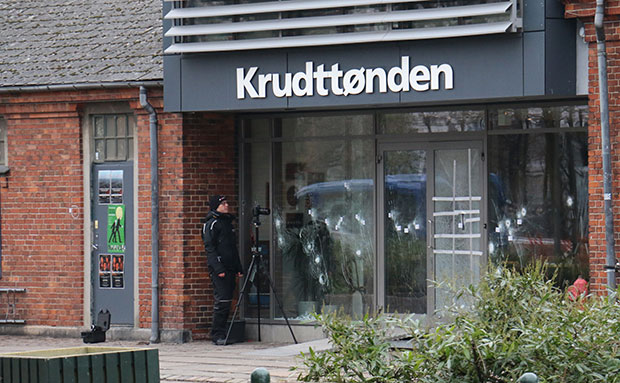Jacob Mchangama: A dangerous evolution of the assassin’s veto

Site of the 14th February 2015 terrorist attack on a debate discussing blasphemy and artistic expression at Krudttønden in Copenhagen, Denmark. (Photo: Benno Hansen / Flickr)
While Saturday’s deadly attack in Copenhagen has many similarities to the one on French satirical magazine Charlie Hebdo, one aspect sets it apart and marks a dangerous evolution in the assassin’s veto.
The attack on Charlie Hebdo targeted the magazine and its editors and journalists. So was the attack against Danish cartoonist Kurt Westergaard who in 2010 escaped an axe wielding Islamist by fleeing into a panic room. Other foiled attacks against Danish newspaper Jyllands-Posten have been spectacular — one involved decapitating all journalists present and throwing their severed heads onto the street below — but also “limited” to the perceived offenders.
But when 22 year old Omar Abdel Hamid El-Hussein opened fire on café Krudttønden (in an area of Copenhagen where I was born and raised) he was attacking not only controversial Swedish cartoonist Lars Vilks. He was in fact targeting all the participants at a debate on free speech and Islam. Neither the film director who was killed nor any other participants (apart from Vilks) had anything to do with the cartoon of the Prophet Mohammed drawn by Vilks. For all we know some of the participants may have been offended by the cartoon and other material mocking Islam and would have expressed such feelings had they been given the chance.
That is after all the whole purpose of debate — differing viewpoints meeting and testing and probing each other’s strengths and weaknesses and thereby enlightening the public at large. By attacking such a public debate Abdel Hamid El Hussein and his enablers sent out a most disturbing message: to earn a death sentence for offending Islam, it is no longer necessary to actually make “offensive” expressions. Participating in a public debate on free speech and Islam will suffice.
That message is likely to have profound consequences for public debate on the very issues that are now more important for free societies to discuss than ever. For who can be expected to stage a debate on Islam and free speech, when it involves risking your life? Who would want to be part of the next panel involving Flemming Rose or Salman Rushdie, and who would be willing to act like sitting ducks in the audience? The few people brave enough to actually cross the red lines of the assassin’s veto will then have to think of the considerable costs involved in providing adequate security, and those participants willing to attend would then have to pay through the nose to risk their own lives.
One can only hope that these pernicious effects of the Copenhagen attack will cause what Salman Rushdie has labelled the “but-brigade” to reconsider the half baked defense of free speech that has become so characteristic since the Danish cartoon affair unleashed a global battle of values between free speech and religion. It should be clear that a free society cannot accommodate with special protection feelings of insult and offense that encompass the mere staging of a public debate on subjects of religion and politics. One also hopes that the victims of the Copenhagen shooting will be spared the shameful accusations of “racism” and “islamophobia” that were soon charged at Charlie Hebdo after the attack in Paris.
Despite the grim realities that confront free speech in contemporary Europe, I’m afraid that we must summon our courage and insist that no topics are off the table in public discourse and that murderers cannot be allowed to decide when, where and what we choose to discuss. The responsibility for crossing those red lines falls heavily on those of us who like to think of ourselves as the guardians of free speech.
Living in liberal democracies most of us will not have had much reason to fear for our safety as part of our free speech advocacy. But if we are serious about defending the right to offend, those of us heeding that call will have to stick our necks out too and get up on the podium next to the Flemming Roses, Salman Rushdies and Yahya Hassans of the world, armed with nothing more than the courage of our convictions.
Related:
Jodie Ginsberg: The right to free speech means nothing without the right to offend
Index on Censorship statement on blasphemy debate attack in Copenhagen
This guest post was published on 16 February 2015 at indexoncensorship.org
